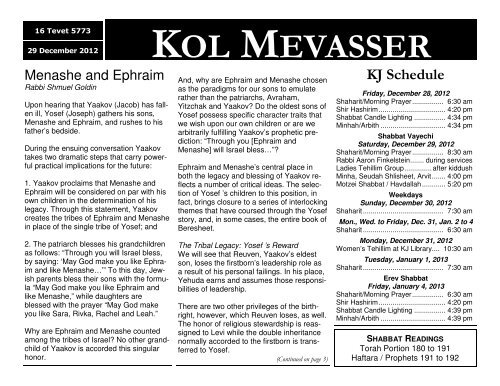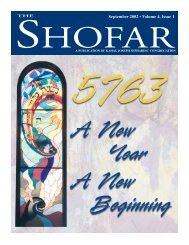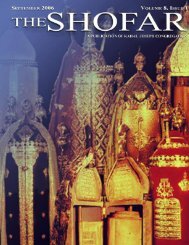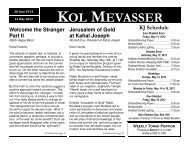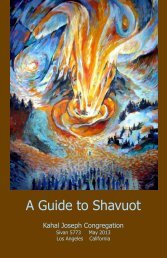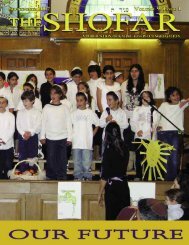Create successful ePaper yourself
Turn your PDF publications into a flip-book with our unique Google optimized e-Paper software.
16 Tevet 5773<br />
29 December 2012<br />
<strong>KOL</strong> <strong>MEVASSER</strong><br />
Menashe and Ephraim<br />
Rabbi Shmuel Goldin<br />
Upon hearing that Yaakov (Jacob) has fallen<br />
ill, Yosef (<strong>Joseph</strong>) gathers his sons,<br />
Menashe and Ephraim, and rushes to his<br />
father’s bedside.<br />
During the ensuing conversation Yaakov<br />
takes two dramatic steps that carry powerful<br />
practical implications for the future:<br />
1. Yaakov proclaims that Menashe and<br />
Ephraim will be considered on par with his<br />
own children in the determination of his<br />
legacy. Through this statement, Yaakov<br />
creates the tribes of Ephraim and Menashe<br />
in place of the single tribe of Yosef; and<br />
2. The patriarch blesses his grandchildren<br />
as follows: “Through you will Israel bless,<br />
by saying: ‘May God make you like Ephraim<br />
and like Menashe…’” To this day, Jewish<br />
parents bless their sons with the formula<br />
“May God make you like Ephraim and<br />
like Menashe,” while daughters are<br />
blessed with the prayer “May God make<br />
you like Sara, Rivka, Rachel and Leah.”<br />
Why are Ephraim and Menashe counted<br />
among the tribes of Israel No other grandchild<br />
of Yaakov is accorded this singular<br />
honor.<br />
And, why are Ephraim and Menashe chosen<br />
as the paradigms for our sons to emulate<br />
rather than the patriarchs, Avraham,<br />
Yitzchak and Yaakov Do the oldest sons of<br />
Yosef possess specific character traits that<br />
we wish upon our own children or are we<br />
arbitrarily fulfilling Yaakov’s prophetic prediction:<br />
“Through you [Ephraim and<br />
Menashe] will Israel bless…”<br />
Ephraim and Menashe’s central place in<br />
both the legacy and blessing of Yaakov reflects<br />
a number of critical ideas. The selection<br />
of Yosef ’s children to this position, in<br />
fact, brings closure to a series of interlocking<br />
themes that have coursed through the Yosef<br />
story, and, in some cases, the entire book of<br />
Beresheet.<br />
The Tribal Legacy: Yosef ’s Reward<br />
We will see that Reuven, Yaakov’s eldest<br />
son, loses the firstborn’s leadership role as<br />
a result of his personal failings. In his place,<br />
Yehuda earns and assumes those responsibilities<br />
of leadership.<br />
There are two other privileges of the birthright,<br />
however, which Reuven loses, as well.<br />
The honor of religious stewardship is reassigned<br />
to Levi while the double inheritance<br />
normally accorded to the firstborn is transferred<br />
to Yosef.<br />
(Continued on page 3)<br />
KJ Schedule<br />
Friday, December 28, 2012<br />
Shaharit/Morning Prayer ................ 6:30 am<br />
Shir Hashirim .................................. 4:20 pm<br />
Shabbat Candle Lighting ................ 4:34 pm<br />
Minhah/Arbith ................................. 4:34 pm<br />
Shabbat Vayechi<br />
Saturday, December 29, 2012<br />
Shaharit/Morning Prayer ................ 8:30 am<br />
Rabbi Aaron Finkelstein ....... during services<br />
Ladies Tehillim Group .............. after kiddush<br />
Minha, Seudah Shlisheet, Arvit ....... 4:00 pm<br />
Motzei Shabbat / Havdallah ............ 5:20 pm<br />
Weekdays<br />
Sunday, December 30, 2012<br />
Shaharit ......................................... 7:30 am<br />
Mon., Wed. to Friday, Dec. 31, Jan. 2 to 4<br />
Shaharit ......................................... 6:30 am<br />
Monday, December 31, 2012<br />
Women’s Tehillim at KJ Library.... 10:30 am<br />
Tuesday, January 1, 2013<br />
Shaharit ......................................... 7:30 am<br />
Erev Shabbat<br />
Friday, January 4, 2013<br />
Shaharit/Morning Prayer ................ 6:30 am<br />
Shir Hashirim .................................. 4:20 pm<br />
Shabbat Candle Lighting ................ 4:39 pm<br />
Minhah/Arbith ................................. 4:39 pm<br />
SHABBAT READINGS<br />
Torah Portion 180 to 191<br />
Haftara / Prophets 191 to 192
VISITING SCHOLAR SERIES<br />
kahal joseph congregation<br />
Rabbi Aaron Finkelstein<br />
“From Family to Nation: The Secret<br />
Power of Blessings”<br />
December 29, 2012 during morning services<br />
Rabbi Finkelstein studied Political Science<br />
and Jewish and Islamic Middle Eastern<br />
Studies at Washington University in St.<br />
Louis. He attended yeshiva in Israel before<br />
completing rabbinical ordination at Yeshivat Chovevei Torah.<br />
Rabbi Finkelstein launched the Prospect Heights Shul<br />
to great acclaim and currently teaches at the Hannah<br />
Senesh Community Day School. He is passionate about<br />
teaching midrash and parsha as well as trying new recipes<br />
and exploring the great outdoors.<br />
Shabbat Kiddush<br />
is sponsored in memory of<br />
Esperance bat Simha Shaaya, z’’l<br />
by Hilda Rojhani<br />
&<br />
Moussa Shaaya<br />
Refuah Shlemah<br />
Gerry Shapiro, Yocheved bat Rachel, Mazal bat Malka,<br />
Dan Herdoon, Mazal Tov bat Salha Matana,<br />
Moshe ben Ezra, Sasson ben Rahel / Sassoon<br />
Moses, Penina bat Henia,<br />
Dov Ber ben Sonia, Hanna bat Esther<br />
Congratulations<br />
Member of the Week<br />
Jonathan Assia<br />
Jonathan Assia, a young member<br />
and participant on High Holy Days<br />
is ALSO a member of the UCLA<br />
marching band seen here performing<br />
half time at the Holiday Bowl!<br />
Condolences<br />
to the family and friends of<br />
<strong>Joseph</strong> Edward Ezra <strong>Joseph</strong>, z’’l<br />
Our thoughts and prayers go out to his<br />
wife Marcelle, his children, grandchildren,<br />
relatives and friends.<br />
KJ YOUTH<br />
CHOIR<br />
Directed by Rabbi Hagay Batzri<br />
Next Meeting: January 13th, 11 am<br />
In Memoriam<br />
We remember these yahrzeit anniversaries for<br />
December 29, 2012 to January 5, 2013. It is customary<br />
to light a memorial candle, donate tzedaka,<br />
and attend services the preceding Shabbat.<br />
16 Tevet / Shabbat, December 29th<br />
Khasnah bat Rahel<br />
17 Tevet / Sunday, December 30th<br />
Ezekiel Menashe Akerib Yehezekel ben Moshe<br />
Victoria Reuben Victoria bat Chahla<br />
Farha Shamash Farha bat Masooda<br />
18 Tevet / Monday, December 31st<br />
David Davoudian David ben Yehezkel<br />
Esperance Mathalon Shaaya Esperance bat Simcha<br />
19 Tevet / Tuesday, January 1st<br />
Yeheskel Goury Yeheskel ben Shaul<br />
Solomon Raymond Shlomo ben Rahamim<br />
20 Tevet / Wednesday, January 2nd<br />
Ronnie Kelly Raphael ben Saleh Moshe Kadoorie<br />
<strong>Joseph</strong> Hayeem Messiah<br />
Ruby Mussry Reuven ben Yaacob Saleh<br />
21 Tevet / Thursday, January 3rd<br />
Solomon Reuben Shlomo ben Reuven D’loomy<br />
Behejohn bat Yehudah<br />
22 Tevet / Friday, January 4th<br />
Matooka Girgiyr Matooka bat Farha<br />
23 Tevet / Shabbat, January 5th<br />
Kovkah Cohen Kovkah bat Yaacov<br />
Hannah Dallal<br />
Pinchas Khalili Pinhas ben Nissan<br />
Emma Moses Amuma bat Farha<br />
<strong>Kahal</strong> <strong>Joseph</strong> Congregation<br />
Rabbi Hagay Batzri • 310.474.0559<br />
10505 Santa Monica Blvd.Los Angeles, CA 90025
(Continued from page 1)<br />
The creation of the tribes of Ephraim and<br />
Menashe can thus be attributed to Yosef ’s<br />
merit. As a reward for his righteousness<br />
and in acknowledgment of his achievements,<br />
Yosef receives his “double portion”<br />
as the progenitor of these two tribes.<br />
Emphasizing Yosef ’s Aloneness<br />
While the creation of two tribes bearing the<br />
names of Yosef ’s sons can certainly be<br />
seen as a reward for Yosef ’s righteousness,<br />
this same phenomenon, in ironic fashion,<br />
underscores a tragic dimension of his life.<br />
Yosef ’s name does not appear in the list<br />
of tribes along with his brothers. Yosef ’s<br />
lonely position as the ultimate outsider is<br />
thus cemented and preserved for posterity.<br />
Yosef never succeeds in becoming part of<br />
any society in which he finds himself. Although<br />
wildly successful in Egypt, he never<br />
earns the full trust of the Egyptians. Even<br />
more significantly, he is never fully accepted<br />
into the company of his brothers, who<br />
do not have confidence in his intentions<br />
right through the end.<br />
A delicate balance, mirroring Yosef ’s complex<br />
life, is thus struck in the tribal system.<br />
Yosef ’s material success will be reflected<br />
in the double portion he receives through<br />
his sons. His isolation, however, is also<br />
mirrored in Yosef ’s own conspicuous and<br />
now eternal absence from the company of<br />
his brothers.<br />
Reaching Across the Generations<br />
Yaakov is the first personality in the Torah<br />
and the only patriarch to openly relate not<br />
only to his children, but to his grandchildren,<br />
as well.<br />
The last patriarch, however, goes a major<br />
step further. He concretizes his relationship<br />
with Ephraim and Menashe through<br />
the creation of tribes bearing their names,<br />
thereby ensuring that the tribal system of<br />
Israel will span the generations. With great<br />
foresight, he consciously weaves the concepts<br />
of the extended family and of intergenerational<br />
relationships into the very fabric<br />
of our national structure. (Note that<br />
building upon this phenomenon, Yaakov’s<br />
son Yosef is the first individual in the Torah<br />
to interact with his great grandchildren.)<br />
These relationships will remain indispensable<br />
to the transmission and development of<br />
Jewish tradition across the ages.<br />
The Blessing: Sibling Harmony.<br />
Ephraim and Menashe succeed in reversing<br />
a tragic trend which characterizes sibling<br />
relationships from the time of Kayin<br />
and Hevel through the patriarchal period.<br />
They are the first major set of brothers,<br />
recorded in the Torah, whose relationship<br />
is not marked by jealousy, rivalry and<br />
strife. The love between Ephraim and<br />
Menashe apparently endures even when<br />
Ephraim is given precedence by Yaakov<br />
over his older brother, Menashe.<br />
When we pray that God will make our sons<br />
“like Ephraim and like Menashe,” we pray<br />
that our progeny succeed in maintaining<br />
the harmony that marked the relationship<br />
of Yosef ’s sons.<br />
A World Apart<br />
Yaakov reacts with wonder when he reflects<br />
upon meeting his grandchildren towards<br />
the end of his life. This reaction mirrors<br />
the unexpected nature of Ephraim and<br />
Menashe’s success. These two children<br />
grew up in exile, separated from their extended<br />
family since birth, yet remained<br />
identifying members of their family.<br />
The patriarch, therefore, selects his two<br />
grandchildren as the paradigm for blessings<br />
across the ages. Their selection sends a<br />
powerful message across the turbulent history<br />
of our often scattered people.<br />
“May God make you like Ephraim and<br />
Menashe,” we bless our sons. May you always<br />
be spiritually connected to your family<br />
and people, no matter where you live, no<br />
matter how physically distant you may be.<br />
BEAUTIFUL ARTWORK<br />
We have magnificent, limited edition hand crafted<br />
artwork for sale created by our member, Jaleh<br />
Partiyeli. Menorahs, chargers, serving platters<br />
and plates hand decorated and designed especially<br />
for <strong>Kahal</strong> <strong>Joseph</strong>, are available for purchase.<br />
These beautiful art objects make a wonderful gift<br />
and an addition to any home décor. Every purchase<br />
is a donation to the synagogue. Please<br />
contact Sarah in the office with your interest.
& Tu B’Shvat Luncheon<br />
following Shabbat Shira services<br />
January 26, 2013<br />
Ronald Einy<br />
and the<br />
Board of Directors of<br />
<strong>Kahal</strong> <strong>Joseph</strong> Congregation<br />
invite our<br />
members to<br />
The luncheon is sponsored in memory of two pillars of our synagogue<br />
whom we will always remember:<br />
Rebecca and Saul Mizrahie z'’l.<br />
We’ll have a traditional Iraqi Seder and luncheon for congregants.<br />
Since Tu B’Shvat celebrates the annual rebirth and renewal of the<br />
trees, the Seder includes a large variety of fruits and nuts to accompany<br />
the meal and offer opportunities to create blessings for our<br />
lives and for the fruition of the year.<br />
KJ’s Tu B’Shvat and Shabbat Shira program<br />
includes a performance by our<br />
youth choir. Our Rabbi Hagay Batzri<br />
will address the topic of "Tu B’Shvat,<br />
Fruit, and the Transformative Power of<br />
Change in Our Lives."<br />
No charge for KJ Members only<br />
<strong>Kahal</strong> <strong>Joseph</strong><br />
Norma & Sam Dabby<br />
Talmud Torah<br />
Jewish Afterschool Education<br />
Hebrew * Prayers/Tefillot * Holidays /Hagim<br />
Shabbat * Torah Learning * Israel Education<br />
Fieldtrips * Art * Drama * Music<br />
Classes taught collaboratively by<br />
Molly Jalali, Dafna Ezran, Mona Tzabi<br />
Classes Offered<br />
Sundays 9:30 to 11:00 am (before choir)<br />
Thursdays 4:00 to 6:00 pm<br />
For information call our office at<br />
310.474.0559


